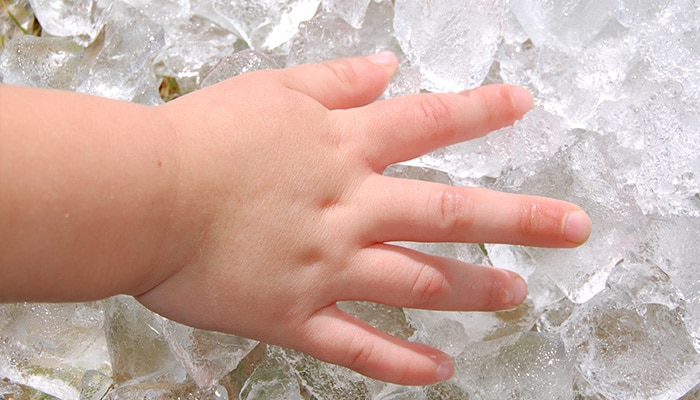While we believe that the books and resources recommended may be of value to you, keep in mind that these are suggestions only and you must do your own due diligence to determine whether the materials are appropriate and suitable for your use. PNC has no sponsorship or endorsement agreement with the authors or publishers of the materials listed.
WINTER

What Freezes?
Children will experiment with freezing different liquids.

Lesson Objective
Children will perform an experiment with different liquids to determine what freezes.
ScienceArtMusic
What You'll Need
- Proximity to a freezer or outside if temperatures are expected to fall below 32° F
- Ice cube trays or muffin pans – 1 per small group
- Pitchers or small measuring cups for pouring – 1 per small group
- Variety of liquids to test such as water, juice, milk, oil, soap, gel, salt water, vinegar, syrup, or any other liquids the children would like to test – enough to fill one ice cube/muffin cup for each group
- Chart paper
- Marker
What To Do
Note: Have the children work in small groups. This activity will require two days, freezing the liquids overnight to observe the next day.
- Display the different liquids and ask the children to describe them (see Guiding Student Inquiry).
- Tell the children they will be performing an experiment to see if any of these liquids will freeze.
- Assist the children with pouring each liquid into one of the cups in their ice cube trays.
- Have the children predict which liquids may freeze and ones that might not; record on the chart.
- Find a spot in the freezer or outside where the liquids will not be disturbed and leave them overnight.
- The next day, distribute the ice cube trays.
- Have the children look at their liquids and identify the ones that froze solid, those that partially froze, and those that remained liquids (see Guiding Student Inquiry).
- Compare the results to the children’s predictions.
- Discuss the differences in the liquids that froze, partially froze, and remained liquids; what is the same about these liquids (see Did You Know?).
Resources
Home School Resources
Home educators: use these printable lesson PDFs to teach this lesson to your home schoolers. They're available in English and Spanish.
Content Provided By
Common Core State Standards Initiative – These lessons are aligned with the Common Core State Standards ("CCSS"). The CCSS provide a consistent, clear understanding of the concepts and skills children are expected to learn and guide teachers to provide their students with opportunities to gain these important skills and foundational knowledge [1]. Visit the CCSS


